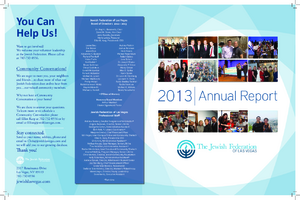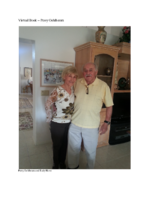Search the Special Collections and Archives Portal
Search Results

Annual Report of the Jewish Federation of Las Vegas, 2013
Date
Archival Collection
Description
Annual report from the Jewish Federation of Las Vegas for 2013.
Text

Biographical essay by Perry Oehlbaum, 2014
Date
Archival Collection
Description
Perry Oehlbaum describes her time in concentration camps in Germany and her liberation in 1945.
Text

John McKay interview, March 3, 1980: transcript
Date
Archival Collection
Description
On March 3, 1980, Donna Malloy interviewed John McKay (b. July 7th, 1926 in North Dakota) about his life in Las Vegas, Nevada. McKay begins by speaking about his family history, his career in the electronics and engineering field for aerospace, as well as his experiences in two wars. Moreover, McKay speaks about his hobbies of hunting and fishing and his time as a musician around Las Vegas. McKay also spends time going over how the city of Las Vegas has grown and changed, the increase in crime, and the extreme floods in the 1950s. Lastly, McKay talks about the Nuclear Test Site, how casino gaming chips were used as money around the city, how the city of Las Vegas started and the future of the valley.
Text

Transcript of interview with Mahamed Youssouf by Barbara Tabach, August 6, 2013 & August 13, 2013
Date
Archival Collection
Description
Ethiopian business owner Mahamed Youssouf became an American citizen in 1986. Born in Harar, Ethiopia, he recalls the hardships he had to endure during the Ethiopia-Somalia conflict. Coming from a family of tailors, he began making clothes with his father at a very early age. Mahamed’s recollections concerning his journey from political refugee to successful businessman demonstrates his resilience and determination to overcome obstacles and achieve his goals. Mahamed moved to Las Vegas, Nevada in 1985, where he rented a storefront in North Las Vegas. The name of his store was Uniform Plus and he focused mainly on making children’s clothes. His efforts proved lucrative as he began buying wholesale in Los Angeles, California, and selling clothes in Las Vegas on the weekends at the outdoor Swap Meet. After a fateful encounter, Mahamed became business partners with Eugene Hoffman, owner of Village East Cleaners. Mahamed firmly believes that communication is the key to socio-economic success. He views education as an investment and states that, “to have dialogue means better relationships.” When the Ethiopian government was overthrown, Mahamed returned home to Africa for a visit. He met his wife while there, got married, and started a family. Mahamed returned to America and bought a family home in Las Vegas. He dedicated his time to teaching his American born children more about Ethiopian culture and taught himself more about American culture— including the African-American experience in Las Vegas, racism, the Moulin Rouge, and the Westside.
Text

David Ober interview, October 11, 2017: transcript
Date
Archival Collection
Description
Tucson, Arizona, native David Ober moved to Las Vegas twice. He arrived reluctantly the first time in 1978 with his parents as a high-school student, when his father, Hal Ober, came to Las Vegas to begin building and marketing the U.S. Home (now Lennar) brand. While the elder Ober soon left U.S. Home to open his own home-building business, R.A. Homes, his youngest child left Las Vegas shortly after his high school graduation to return to his native Tucson, follow in the footsteps of his siblings, and attend the University of Arizona. After graduating from the University of Arizona David Ober opened his own mortgage company and began building a life in Phoenix. In the late 1980s he agreed to take a large pay cut, return to Las Vegas, and learn his father's business from the ground up. At the time, Hal Ober was developing his award-winning, master-planned community, Desert Shores. David Ober, the youngest of the five children of Hal and D'Vorre (Dee) Ober, agreed to participate in the
Text

Transcript of interview with Elinor Horden by Valerie Fujii, February 13, 1930
Date
Archival Collection
Description
On February 13th, 1980, collector Valerie Fujii interviewed dancer, Elinor Horden, (born May 21st, 1930 in Ohio) at the University of Nevada, Las Vegas. This interview covers local entertainment in the 1950s and the social and environmental changes that have occurred in Las Vegas, Nevada.
Text

Transcript of interview with Gertrude Rudiak by Claytee White, January 11, 2007
Date
Archival Collection
Description
Gertrude (n?e Rightman) Rudiak was born in 1915 in North Dakota to Russian immigrants. She grew up in Wisconsin until 1924. That was the year the family drove to California via the Yellowstone Trail, a dusty, undeveloped road marked by yellow stones. In Los Angeles, her father practiced chiropractic, a holistic approach to well-being for which there was little knowledge at the time. Gertrude earned her music degree at University of California at Berkeley; a decision that did not lead to a career. She then attended a business college and got a job as a social worker in Northern California. In 1941, she met and soon married George Rudiak. It was the advent of World War II. George enlisted in the service and was assigned to Las Vegas Gunnery School (Nellis Air Force Base.) Since he had a law degree from University of California at Berkeley and passed the Nevada Bar exam, he found supplemental employment with local attorneys. Las Vegas became the Rudiaks? permanent home where they raised their five children. In this interview Gertrude recalls the stories of coming to live in Las Vegas of the 1940?s: their phone number was 1-2-3; the neighborhood they lived in longest being Scotch 80s and being part of the secular and Jewish communities.
Text

Transcript of interview with Mike and Susan Baller by Barbara Tabach, March 16, 2016
Date
Archival Collection
Description
In this interview, Mike and Susan Baller reflect upon their lives in Las Vegas, from growing up as teenagers amongst the tight-knit Jewish community, to mob influence on the city, and the impact of the city's growth. Mike shares stories about first arriving in Las Vegas to live, being a teenaged busboy at Binions Horseshoe to being related to Moe Dalitz -- in Michigan Mike drove a truck for the Dalitz dry cleaning business.
Text

Transcript of interview with Jerry Fox by Barbara Tabach, November 12, 2014
Date
Archival Collection
Description
Interview with Jerry Fox by Barbara Tabach on November 12, 2014. In this interview, Fox discusses his father's restaurant, Foxy's Delicatessen, which opened on the Las Vegas Strip in the 1950s, and his own business endeavors including the Tinder Box and an embroidery business.
Jerry Fox grew up in Los Angeles until his family moved to Las Vegas in February 1955, where his father opened Foxy's Delicatessen, the city's first Jewish deli. Jerry would go on to follow in his father's entrepreneurial footsteps, operating several ventures across different industries, including his own restaurant, Foxy Dog. Jerry sold Foxy Dog in 1975 after going through a divorce, the same year that Foxy's Deli closed.
Text

Transcript of interview with Joseph Gemma by Dan Murphy, March 1, 1979
Date
Archival Collection
Description
On March 1st, 1979, collector Dan Murphy interviewed Anderson Dairy production manager, Joseph Gemma (born on October 25th, 1934 in Norwalk, Connecticut) in his home in Las Vegas, Nevada. This interview covers the history of Las Vegas, including employment opportunities, construction work, housing developments, and the hotels on the Strip. Joseph also recalls social and environmental changes and local recreation, including sports and the importance of gaming in Nevada.
Text
